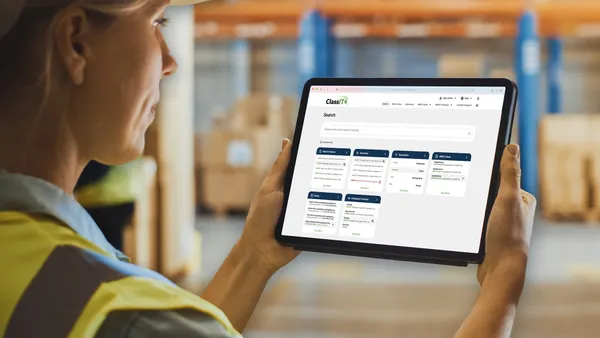Dive Brief:
- UPS and Cloud services provider Sage have teamed up to offer small businesses a lone, real-time source of customer and order data to enhance financial management and shipment processing, a Sage press release said Monday.
- The pairing supports a cloud financial management solution, built on the Salesforce platform, to integrate accounting and shipping for small and medium businesses (SMEs). SMEs can then achieve a lead on competitors by enhanced insights into business profitability.
- Further benefits to SMEs include a user-friendly experience, fully accurate shipping costs and intelligent analytics.
Dive Insight:
Cloud-based business solutions are growing in popularity within the supply chain and are now at "mass scale adoption."
The International Data Corporation (IDC) predicts that in just two years, approximately 80% of supply chain interactions will happen across cloud-based commerce networks.
Cloud-based technology is particularly accessible to small and medium sized businesses, but because SMEs generally have smaller budgets than big companies, they sometimes struggle with adoption. That's because cloud adoption often requires a careful plan to keep operations running smoothly.
"Business growth and technology innovation require the scalability, flexibility and mobility inherent in the cloud, which small companies need to remain competitive," said Nicole Hardin, director of product management at Sage Software. "The cloud fuels an ecosystem of connected business applications that have less overhead costs that come with maintaining on-premise solutions, give organizations the power to grant employees secure access to information no matter where they are working, and enable information sharing across the organization."
"While many small companies feel that manually controlling their data in their organization is the safest course – this has actually proven to provide the highest level of risk."

Nicole Hardin
Director of Product Management at Sage Software
The partnership with UPS is especially valuable to small businesses and could promote greater cost savings and efficiency.
"Research shows that many small businesses are challenged with calculating accurate costs for customer shipments, based on location and delivery preferences," Hardin told Supply Chain Dive. "The research also shows they are challenged with managing shipping with costly systems that require reentry of information, and too much time is spent inputting, tracking and processing the same shipment information."
But Hardin also said no business should rely completely on the cloud, or any system, for data storage and protection.
"There is a level of risk in any system (even if that system is paper based) but the lowest risk profile available today are offered by cloud platforms," she said. "Not only do cloud platforms deliver many business benefits, they also provide the most secure way to store and operate your company data. While many small companies feel that manually controlling their data in their organization is the safest course – this has actually proven to provide the highest level of risk. By holding your data in an on-premise system your risk data loss, system outages (business disruptions) and the biggest risk of all – your data and customer’s data being stolen. It is no longer a matter of if someone will try and hack your data, but rather when will your organization face a potential data breach."













